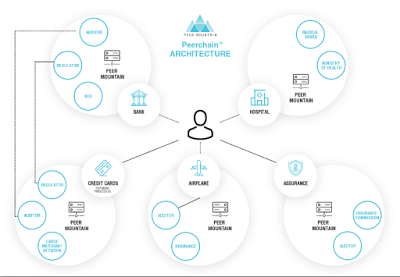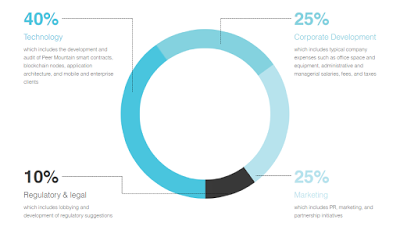PEER MOUNTAIN
PEER MOUNTAIN
WHAT IS PEER MOUNTAIN?
Real World Trust and Privacy for Digital Transactions
Peer Mountain further provides users with ownership and control over their identity that is cryptographically safe. It is an end-to-end application ecosystem that facilitates the safe trading and exchange of digital and physical services.
We have also filed trademarks for the Peer Mountain and Peerchain brands with the EUIPO 017282931 and 017350182 brand numbers. It is our intention to release the Peer Mountain client SDK for Android and iOS as open source, and to open the Peer Mountain Attestation Engine SDK source. We also intend to submit the Peerchain Protocol to the RFC to develop an open standard that can be used as widely as possible in any economic context.
Protocol Peerchain
Each operation in Peer Mountain is defined by the message type. These messages are wrapped in envelopes that provide basic general information about all operations. The message itself contains details about each operation. Messages that change the state of the system are aggregated and timestamped in blockchain layers that can not be changed.
Service providers, or other external entities (eg regulators), can run block nodes without having to run Message / Object storage nodes.
Only message and hash identifiers are associated with the message content stored in the block layer. All other information is stored in a high-performance database.
Cross-Chain Compatibility
Different blockchains are not compatible across chains, and are not capable of handling cross-chain transactions across multiple instances of the circuit.
Peer Mountain overcomes this challenge. Chain and storage form the operation layer of each instance. The patented patented PeerchainTM protocol then allows Peer Mountain users to communicate with various things, so they can transmit digital assets across the chain. In addition, digital signatures recorded in one instance remain legally binding throughout Peerchain
Efficient Transparent Transactions
Latency in communication between blockchain node nodes because establishing consensus across chains limits their transaction capacity. This means that blockchains do not seem to be able to process transactions at the speed required for large-scale transaction processing systems.
We have taken an innovative approach to overcome this limitation. We believe that blockchain does not need to operate globally in every possible node. In contrast, Peerchains can co-exist and work harmoniously, each focusing on a larger ecological section of trust.
Each Peer Mountain operates a Peerchain that we can use for their respective service providers, regulators, auditors, and industry watch groups or consumer protection groups. Anyone who wants to review chain integrity can access the publicly available chain explorer.
Peerchain Technology
Clients view the Peer Mountain example in a transparent manner. Achievements are very easy to do. The substance is deployed by service providers operating in regulated industries.
Storage
Blockchains are not meant to store large amounts of data, which makes sense: the smaller the data structure, the more efficient the blockchain is.
Peer Mountain stores hashes that refer to, and retrieve, encrypted information stored in off-chain storage. Peer Mountain samples can store encrypted objects in Storj, IPFS, HDFS, TahoeFS, Amazon S3, or other available storage solutions that provide consistent high read / write performance.
High Scalability
Because of their consensus mechanism, blockchains require higher data throughput. However, blockchains do not have the capacity to handle large transactions simultaneously.
Peer Mountain enables secure and transparent service segmentation across blockchain deployments. This means an organization can deploy services that require high volume of real-time transactions on dedicated Peer Mountain blocks, while applying the remainder of their services to the common Peer Mountain block.
For example, a bank can run separate instances for demand deposits, certain types of credit cards, and car loans. This setup divides the volume of transactions across cases, enabling banks to achieve higher throughput data cross-services, as well as cross-sample data compatibility. This means the bank can use information from customer's credit card documents in the form of car loans and checking accounts.
TOKEN SALE
Peer Mountain Smartcap Parameters
Round Expansion Factor 75% Discovery Factor Price 5% SmartcapTM Round 1 25% Discount Token Parity Level 1,500 PMT = 1 ETH Cumulative Sales Round 4 Cap 223.437.500 PMTPutaran 4 Cumulative ETH 124,181 ETHRound 4 Price Discovery Point 1.728 PMT = 1 ET
Peer Mountain Token Distribution:
Sales40% of PMTPeer Mountain Reserve issues40% PMT Compensation problems Tim10% problem PMT Legal Backup8% PMT issues Reserve 2% Advisory problems PMTToken TypeToken ERC-20 Standard Receive FinalFinux ICODi Smartcap
Allocation
We will allocate results in four key areas of interest:
40% Technology: which includes the development and audit of smart contracts Peer Mountain, block nodes, application architecture, and mobile clients and enterprise25% Enterprise Development: which includes typical corporate costs such as office space and equipment, administrative and managerial salaries, fees and taxes 10% Regulatory & legal: including lobbying and developing regulatory advice25% Marketing: which includes PR initiatives, marketing, and partnerships.
Some Resources For Reference:
Website: http://www.peermountain.com/
Bitcointalk Thread: https://bitcointalk.org/index.php?topic=2642081.0
Telegram: https://t.me/peermountain
Twitter: https://twitter.com/PeerMountain
Sedang: https://medium.com/peermountain
Diposting oleh rawon ayam
Bitcointalk Usertname: Rawon ayam
Profil URL Bitcointalk saya: https://bitcointalk.org/index.php?action=profile;u=1397196








Comments
Post a Comment